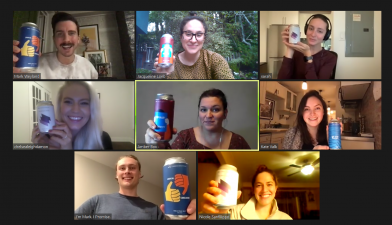This year was filled with uncertainty for everyone, at home and especially in the workplace. We’ve walked our partner companies and candidates through situations that nobody wants to find themselves in: managing layoffs, halting bonuses, changing careers in an unstable job market, and hiring fully remote teams for the first time out of complete necessity.
Those who work in small startups also felt the uncertainty of this year deeply. Without the reassurance and security that often comes with working for a large company, startups have more than ever had to learn how to adapt and pivot quickly to their changing environment.
Also on Mediabistro


Here at Scouted, every Monday our team shares “Wins and Woes” as a way to reflect on the positives of the past week’s KPIs while also maintaining transparency about what didn’t go so well and issues that may have come up.
While we won’t pretend to have all the answers, we wanted to share what working at a startup has been like for our team this year while we did our best to pull on the good and celebrate the small (or not so small) wins of 2020.
Scouted’s 2020 Wins
We led with conviction
The year was about rising above the “maintaining bottom line” mindset that is usually front-of-mind during a financial crisis. For many CEOs, 2020 served as an opportunity to prioritize purpose, transparency, and authenticity — with customers and employees alike.
Regardless of company size, executives have faced the challenge of maintaining outward strength and conviction despite a potentially complex and uncertain road towards profitability, stability, or certainty of the team’s future.
This was no exception for Jacqueline Loeb, Scouted’s Co-founder and CEO:
Community and morale have always been important to me as a CEO, but during this pandemic besides managing runway, managing morale and a strong sense of community has been paramount. I found that with everyone remote, I need to be even more deliberate about how to ensure my team feels connected to each other, their work, and the mission of Scouted. This means everything from being extremely disciplined about holding one on ones with my team to spending a lot more time during meetings talking about life outside of work, to being creative about team bonding events. I have spent a lot more time and effort working to manage and lead my team with discipline and compassion.
We stepped up to the plate
This year not only brought change for company-wide leadership teams, but also for department and team managers. For many, the move to remote work meant relearning how to manage not only projects but people, too. And remote management is not the same as managing in an office.
For Sarah, Scouted’s Director of Operations, the move to remote management, especially at a seed-stage startup, brought a realization that owning her management role was more important than “feeling comfortable” in her WFH role:
The first few weeks of working from home were difficult for me. At a personal level, I struggled with staying motivated and upbeat, especially given that I generally thrive in a live, collaborative environment. But, as a senior member of a small, young team, I quickly realized I had to step up to the plate. It was in the company’s interest — and my own — that I remain positive and forward-thinking among teammates, supportive of our CEO’s strategic decisions to keep us afloat, and hopeful that there would be a way forward for an HR-tech startup. Shifting my mindset helped me to refocus my nervous energy on proactive strategic projects and aid in positioning the team to be able to focus on what we could control.
We focused on our community
Early on during this year, for many employees, strict quarantine guidelines meant that a Zoom meeting might have been the only interaction they had with someone on any given day. Scouted prioritized learning how to keep a strong company culture, despite working remotely. Mark, Head of Sales and Business Development shares how he felt his work community grow stronger and lean on being transparent with each other, even while distanced.
I’m a social person, and not just because my work in business development requires it, but also because I really do enjoy people. The demands of an isolating quarantine, especially as someone living alone, require fortitude and grit. But the small size of Scouted’s tight-knit team tethered me to sanity. We came together not only as colleagues but also as our own little quarantine family. We helped each other solve work challenges, of course, but we also overcame personal struggles, which allowed us to rise up as an affirmed, cohesive, and mighty unit. We strove to help people find jobs in a difficult economy and to help each other keep track of ourselves as a difficult year continued to press on. For that, I’ll always be both proud and grateful.
We found our motivation
As of July 2020, 42 percent of the U.S. labor force was working from home full-time. This huge shift led to a major adjustment for many. Learning to diminish distractions, push through procrastination, and muster up motivation was a huge part of learning to work from home for all of us.
Kate, Scouted’s Product Manager, says,
Before the pandemic, I was used to being busy. Working well into the night and squeezing in errands and social activities when I could. Of the ranging impacts the pandemic has had on all of us, this feeling of ‘work busyness’ changed for me dramatically – despite there being just as much to do, if not more as our HR startup adapted to the impacts of the pandemic. NYC hit PAUSE and so did a lot of my usual motivation.
I recently heard a comparison of this mental block to Newton’s First Law of Motion – a body in motion stays in motion. Going from the environment of a small, collaborative startup office to working alone from my living room was like starting a sprint from a dead stop, instead of the jog that I had become so used to and thrived on. With the support of transparent work culture and a Founder acutely keyed into company morale, not to mention trial and error, discipline, and lots of projects, I picked it up to a walk and am slowly back into a jog once again.
We learned how to communicate and stay connected
Other remote employees, like Chelsea who works in content marketing, felt her WFH struggles validated while also feeling more connected to the rest of the team.
I was Scouted’s first remote hire back in 2018. While I considered myself extremely lucky to be able to work from home while also working full time for a growing startup, working remotely for an in-office team came with its struggles. Being the only floating head on a Zoom screen made it harder to follow meetings or to be in touch with the rest of the team due to not being present for impromptu office conversations, social events, etc.
During the pandemic when the whole team shifted to remote work, I found it much easier to connect with the team seeing as we were now all floating heads. My struggles of working from home (like distractions, finding motivation, staying in the know) felt validated by the rest of the team now also learning to adjust in real-time. And while I know the team won’t stay remote forever, I think it’s given us great insight on how to keep our remote employees in the loop.
We learned to be even more flexible, managing mom-life and work-life
Not only did we have to re-learn how to work from home, we had to learn how to do life completely from home as well, and balance them simultaneously. According to a Gallup coronavirus tracking survey of more than 1,200 parents, 56% of parents found remote learning difficult for their families, including 16% of parents who said it was “very difficult.”
Amber, who works in Talent Support at Scouted says,
As a mom of three with a busy household, being home and having a structured schedule has always been important. So, when the world was turned upside down by the pandemic and the rest of my team had to shift to remote work, I thought this would be easy–I had been working at home for years, after all. What I didn’t realize was how difficult it would be to have my kids home full-time and helping them shift to virtual learning while also shifting and adapting in my own role at work to meet the demands of an ever-changing world.I had to rely on skills I hadn’t leaned on in a long time and that meant a lot of adapting. I had been used to a set, structured schedule, but working remotely at a startup with children at home has taught me, more than anything that, while time-management and structure are immensely important to be productive, there is also a great need for you to adapt and shift with the changes that each day can bring. Flexibility gives us the space to bend when we sometimes feel like breaking.
And simply put, we kept the faith
When facing moments of uncertainty, sometimes it comes down to simply having faith in the adaptability of your business. When we can’t control every outcome, which is rarely the case at an early-stage startup, we have to rely on the relationship and trust that we’ve built with our team.
Scouted’s Account Management lead gets real on her experience this past year:
When COVID hit and the reality set in of what was going to happen, I didn’t immediately panic because I knew a couple of things to be true. First, was that my scrappy a$$, seed-stage startup company that I worked for had always been just that, very scrappy and always adapting to work towards something better. Second, I believed in and implicitly trusted my CEO and co-founder because no matter how good or bad things were, she was always transparent and supportive of our ideas. Lastly, I was simply grateful that no matter what did happen, that I had worked with and gotten to know these people in such an intimate way as you do on such a small team.



.png)





